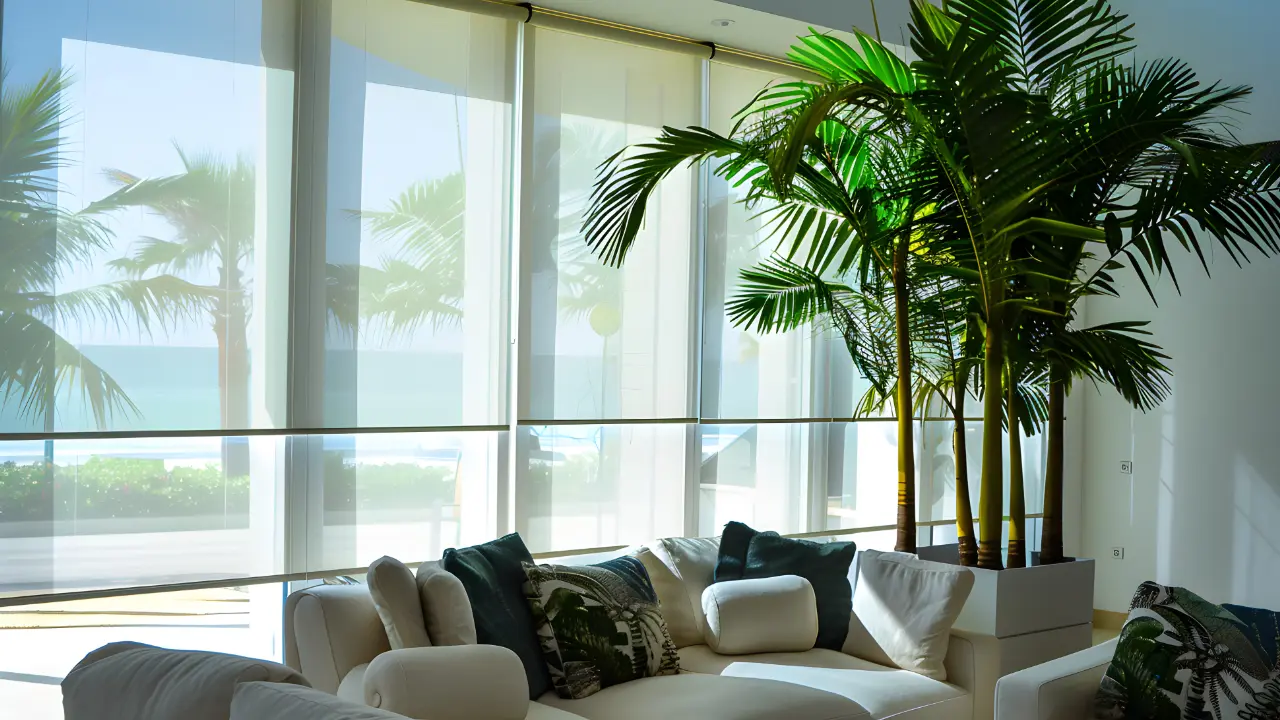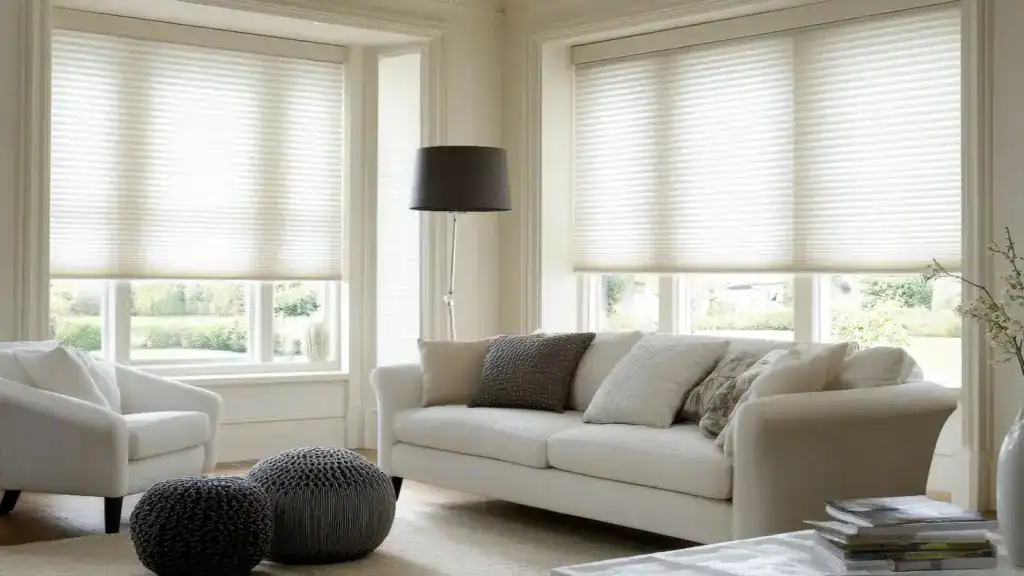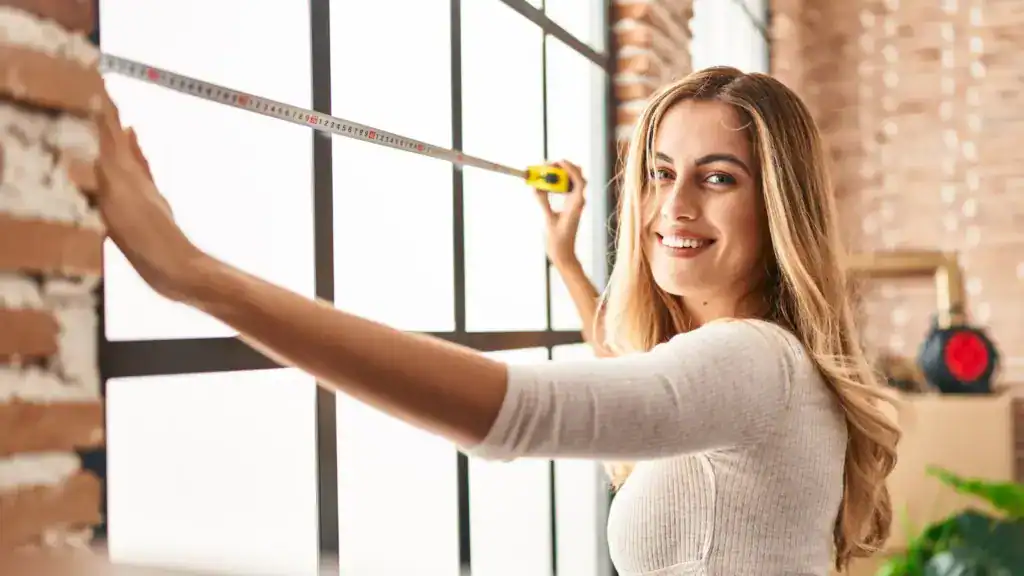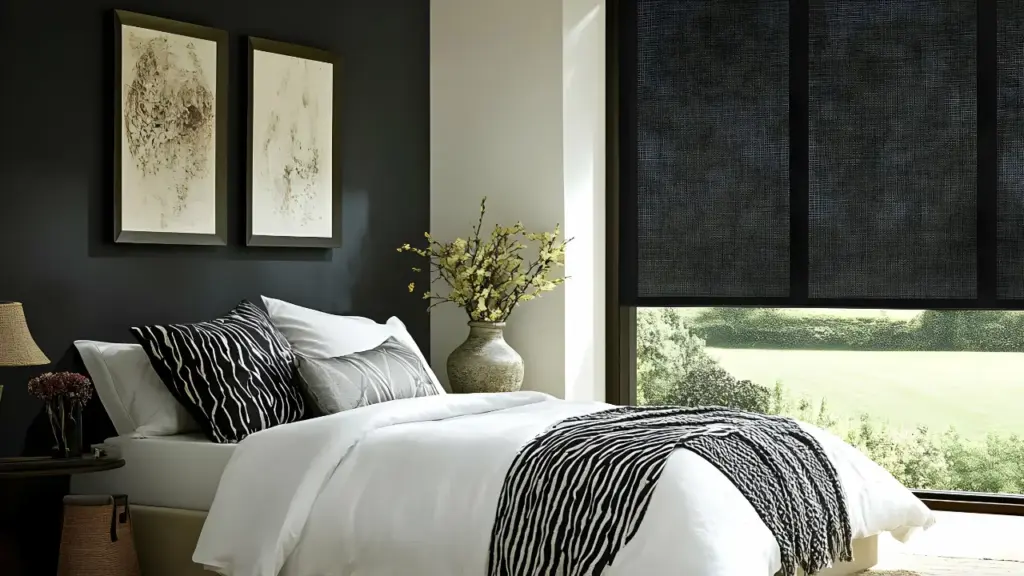What Are Solar Shades & Why Consider Them for Your Home?

In Los Angeles, the summer solstice occurs in late June. That’s when the day is longest — approximately 14 and a half hours.
August is the hottest month, but July and September can be brutal, with temperatures sometimes soaring into triple digits.
California’s temperate weather feels much less temperate at summer’s peak, especially if you live inland. As sunlight blasts through your windows and air conditioning bills skyrocket, you may close the blinds all the way, turning your home into a sunless cave and blocking yourself from the view that you love.
So what’s the answer, then? Move to a better climate? Good luck with that.
You may be a candidate for solar shades.
What Are Solar Shades?
Solar shades are specialized window treatments that filter sunlight while maintaining a view of the outside.
They’re made from a lightweight fabric that reduces glare and screens harmful UV rays without completely darkening the room. Unlike standard shades, they allow for varying degrees of light filtration and visibility, depending on the fabric’s openness factor, ranging from 1% to 14%.
The secret sauce of solar shades is their fabric, woven to precision from a special material. It reflects sunlight away from your windows, while its open weave lets air circulate and maintains a view of the outside.
This unique combination of features keeps your home cooler and more comfortable without sacrificing natural light or visibility.
Why Choose Solar Shades?
1. Energy Savings
These shades can significantly lower your cooling costs during the hot months. Here’s how they help:
- Solar shades reflect sunlight, reducing heat gain in your home by up to 80%.
- Their open weave decreases hot pockets of stagnant air.
2. UV Protection
UV rays are notorious for damaging indoor furnishings.
- Solar shades screen harmful UV rays, protecting your furniture, floors, and artwork from fading and sun damage.
- The lower the openness factor, the more UV rays are blocked.
3. Light Control
- Different levels of open weave in your fabric enable varying levels of light filtration and visibility.
- Solar shades admit natural light without harsh glare.
- You can opt for blackout solar shades for complete light blockage.
4. View Preservation
Breathtaking views deserve to be appreciated. With solar shades, you don’t have to choose between comfort and a view.
- They maintain a connection with the outside while reducing glare and heat gain.
- Darkening options are available for those times when you want less sunlight.
5. Flexible Aesthetics
Solar shades come in various colors and fabrics. It’s easy to find a style that best fits your home.
- They’re available in different weave styles, such as basket weave or twill, adding texture to your windows.
- Colors and patterns include neutrals, bold hues, and subtle prints.
6. Easy Maintenance
Solar shades need little upkeep.
- They’re crafted from durable materials that are easy to clean.
- Wipe them down with a damp cloth when needed.
7. Eco-Friendly Factor
- Solar shades reduce energy consumption, helping the environment and your wallet.
- Sustainably sourced materials make these window treatments more eco-friendly than traditional blinds or curtains.
Choosing the Right Solar Shades
When considering solar shades for your home, here are some key factors to keep in mind:
- Location: Where will the shades be installed, and how much direct sunlight will they receive? This will determine the fabric’s openness factor needed for optimal performance.
- Window Size and Shape: You may need custom shades for non-standard or oversized windows.
- Window Orientation: South and west-facing windows typically receive more direct sunlight and may require shades with a lower openness factor.
- Climate Considerations: Shades that offer maximum UV protection and heat reduction may be the best option in particularly hot or sunny regions.
- Installation Type: Do you prefer inside-mounted or outside-mounted shades? This decision can affect aesthetics and the amount of light filtration.
- Budget: Prices vary significantly based on fabric quality, size, and custom options.
- Manufacturer Reputation: Choose a reputable brand to ensure better quality and durability.
Types of Solar Shades
During your search, you’ll encounter several types of solar shades. Each type offers unique benefits.
- Roller Shades: These are the most common type of solar shades, with a simple, modern design. They roll up from the bottom when not in use.
- Dual Roller Shades: These have two fabrics, one on each side of the shade, allowing for more versatility in light control and privacy.
- Top Down Bottom Up Shades: These shades can be lowered from the top or raised from the bottom, providing greater light and privacy control.
- Motorized Shades: These can be controlled remotely or even automatically to open and close at certain times or under certain conditions.
- Roman Shades: This style is more decorative than other solar shades. It forms soft folds when raised.
- Honeycomb Shades: Also known as cellular shades, these have a layered design that traps air for better insulation.
- Pleated Shades: Similar to honeycomb shades, but with a single layer instead of multiple layers, with less insulation impact.
Conclusion
Solar shades offer a means to combat intense sunlight while enjoying natural light and views. With their energy-saving capabilities, UV protection, customizable aesthetics, and easy maintenance, they’re a valuable investment for any homeowner seeking an upgraded lifestyle.
So don’t suffer through another scorching LA summer — contact Aero Shade for a free estimate to install solar shades in your home or business. We guarantee all our products, customize them to your specs, and ensure you’re happy with the results.
FAQs: More about Solar Shades
Q: Can solar shades be installed outdoors?
Solar shades can be used in outdoor spaces like patios and porches. They provide shade, reduce glare, and add privacy to outdoor areas.
Q: How do I clean solar shades?
Vacuum with a brush attachment to remove dust or wipe them down with a damp cloth. For more stubborn stains, use a mild detergent.
Q: Do solar shades provide privacy at night?
No, when the lights are on inside, outsiders can see in. Consider pairing solar shades with curtains or blackout shades for complete privacy after dark.
Q: Do solar shades block heat?
Solar shades reduce heat gain by reflecting sunlight and minimizing the heat entering your home. This can lower cooling costs during hot months.
Q: Can I automate my solar shades?
Many solar shades come with motorized options that enable remote or automatic control, a convenient feature for hard-to-reach windows or control from anywhere in the home.
Q: How do I choose the right openness factor for my solar shades?
Consider the room’s purpose and the amount of natural light you wish to maintain. A lower openness factor offers more UV blockage and privacy but admits less light, while a higher openness factor permits more light but offers less privacy.
Q: Are solar shades available in custom sizes?
Many manufacturers offer custom sizing for solar shades to fit unique window dimensions. Be sure to measure your windows accurately and consult the manufacturer for the best sizing option.
Q: Will solar shades fade in direct sunlight?
Prolonged exposure to direct sunlight may lead to some discoloration over time. Opting for higher-quality materials can enhance durability and resistance to fading.


